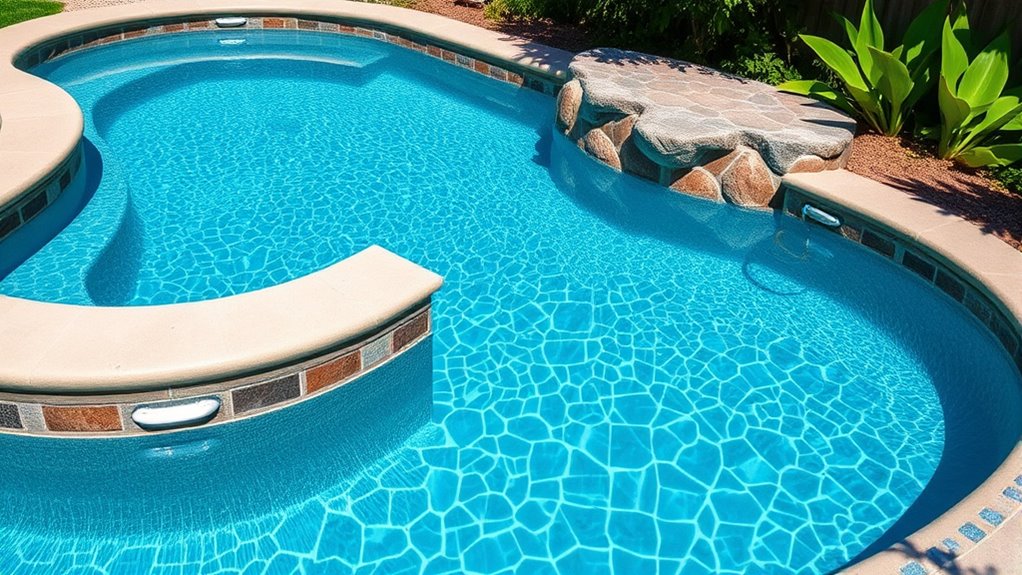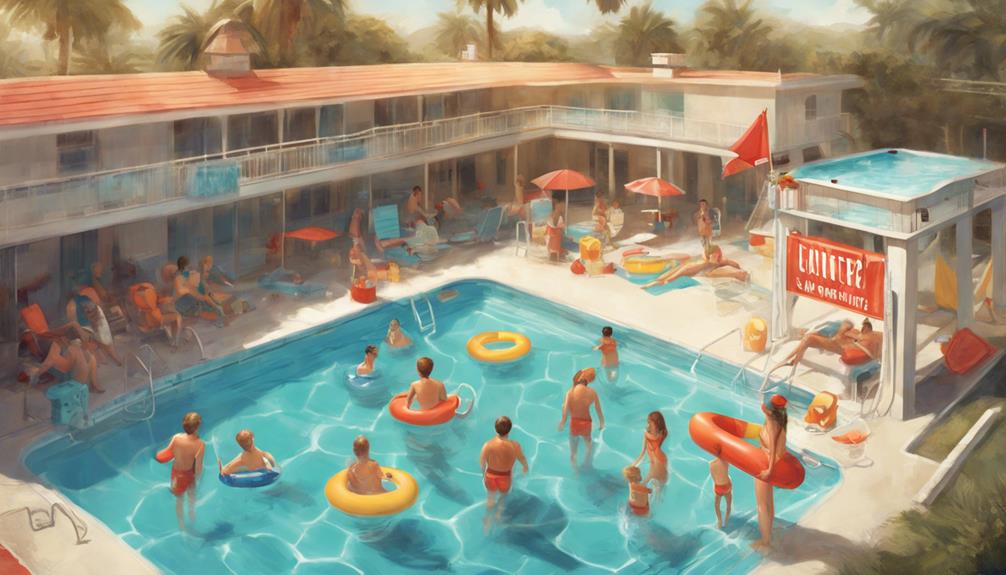When choosing a backyard pool, you can pick from concrete, vinyl, or fiberglass options. Concrete pools are highly customizable and durable but require more maintenance and longer installation times. Vinyl pools are easier to install and maintain but have liners that may need replacing over time. Fiberglass pools are quick to set up, low maintenance, but limited in size and shape. To discover which option fits your space and lifestyle best, keep exploring the details.
Key Takeaways
- Concrete pools are highly customizable but require more maintenance and longer installation times.
- Vinyl pools feature flexible liners that are easier and quicker to install, with lower upfront costs.
- Fiberglass pools are prefabricated, offering fast installation and low maintenance with non-porous surfaces.
- Maintenance needs vary: concrete pools need regular cleaning, while vinyl and fiberglass pools have simpler upkeep.
- Safety features and design options differ; concrete pools can include custom safety ledges, while fiberglass pools have smooth, slip-resistant surfaces.

Are you unsure which backyard pool type best suits your space and lifestyle? Choosing the right pool involves considering factors like maintenance needs, safety features, and how you plan to use it. The three main types—concrete, vinyl, and fiberglass—each have their own advantages and drawbacks, so understanding these can help you make an informed decision. Think about how much time you’re willing to dedicate to pool maintenance, as well as the safety features that are important to you, especially if you have children or pets.
Concrete pools, also called gunite or shotcrete pools, are highly customizable. They’re built on-site, which allows you to design nearly any shape or size you want. But keep in mind, concrete pools typically require more pool maintenance because the surface is porous and can develop algae or staining if not properly cared for. They also take longer to install, often several weeks, and can be more expensive upfront. On the plus side, concrete offers excellent safety features in terms of durability—its solid structure means fewer worries about cracks or damages—and you can add features like safety ledges or shallow areas for kids. However, because of the rough surface, you might want to smooth it out with a finish that’s safer for swimmers, especially children.
Concrete pools are highly customizable but require more maintenance and longer installation times.
Vinyl pools come with a flexible liner that’s easier to install and usually less costly than concrete. They’re a good choice if you want a quick setup and a smooth surface for safety and comfort. Pool maintenance tends to be simpler, as the liner prevents algae buildup and staining, but it does require regular inspections because liners can puncture or wear out over time. Vinyl pools are often less customizable in shape, but they can be designed to fit your yard’s dimensions. Safety features are important here too—adding fencing, alarms, or covers can help prevent accidents, especially since the liner can be slippery when wet.
Fiberglass pools are prefabricated shells made in a factory and delivered to your backyard. They’re quick to install—typically within a week—and require less pool maintenance because the smooth gel coat surface resists algae and scaling. Safety features come into play with their non-porous surface, which reduces slipping hazards, and many models include built-in steps and benches for added safety and comfort. Fiberglass pools are generally durable and resistant to staining, but they do have size and shape limitations due to their factory design.
Ultimately, your choice depends on how much time you want to spend on pool maintenance, your safety priorities, and your aesthetic preferences. Each type offers unique benefits, so weigh these carefully to find the perfect fit for your backyard oasis.
Frequently Asked Questions
Which Pool Type Has the Lowest Maintenance Requirements?
Fiberglass pools generally have the lowest maintenance requirements. You’ll appreciate their smooth surface, which resists algae growth, reducing cleaning time. With fewer pool color options to worry about, you can focus on adding pool safety features that keep everyone secure. Plus, their durable shell means fewer repairs. Overall, fiberglass pools save you time and effort, making maintenance simpler and more manageable for your backyard oasis.
How Long Does Each Pool Type Typically Last?
Imagine each pool as a trusty shield protecting your summer fun. A concrete pool, like a fortress, lasts 25-50 years thanks to its durability, but needs upkeep. Vinyl pools, more like a delicate tapestry, typically last 7-15 years, requiring replacement of liners. Fiberglass pools, akin to a smooth stone, offer a lifespan of 20-30 years with minimal maintenance, showcasing solid durability and a favorable lifespan comparison.
Are There Specific Climates Better Suited for Each Pool Type?
You’ll find concrete pools offer great climate adaptability, thriving in both hot and cold regions with proper insulation and heating. Vinyl pools are more sensitive to seasonal considerations, as extreme temperatures can cause liner issues or shrinkage. Fiberglass pools adapt well to various climates, but in freezing areas, you’ll want to make certain of proper winterization. Overall, choose based on your local climate and seasonal needs for long-lasting enjoyment.
What Are the Initial Installation Costs for Each Pool Type?
Pricing for pool installation varies considerably, so you’ll want to contemplate your budget considerations carefully. Concrete pools tend to be the most costly initially, with high installation costs due to extensive excavation and finishing. Vinyl pools are usually more affordable upfront but may have ongoing maintenance expenses. Fiberglass pools strike a balance, offering moderate installation costs with quick, simple setup. Your choice depends on your financial flexibility and long-term investment plans.
Can These Pools Be Easily Expanded or Modified Later?
You can usually pursue pool expansion or retrofit options, but how easy it is depends on your pool type. Concrete pools are highly customizable, making expansion relatively straightforward. Vinyl pools are more limited; they often require significant reconstruction for major modifications. Fiberglass pools are the least adaptable, with limited retrofit options. If you’re considering future pool expansion, concrete is your best bet, while vinyl and fiberglass may need more planning upfront.
Conclusion
No matter which pool type you choose, imagine yourself stepping into crystal-clear water, sunlight dancing on the surface, and the gentle splash as you plunge in. Whether it’s the sleek, custom look of concrete, the smooth feel of vinyl, or the seamless beauty of fiberglass, your backyard oasis is just a decision away. Picture yourself relaxing poolside, the warm sun on your skin, creating memories that will last a lifetime. Your perfect backyard escape is within reach.










